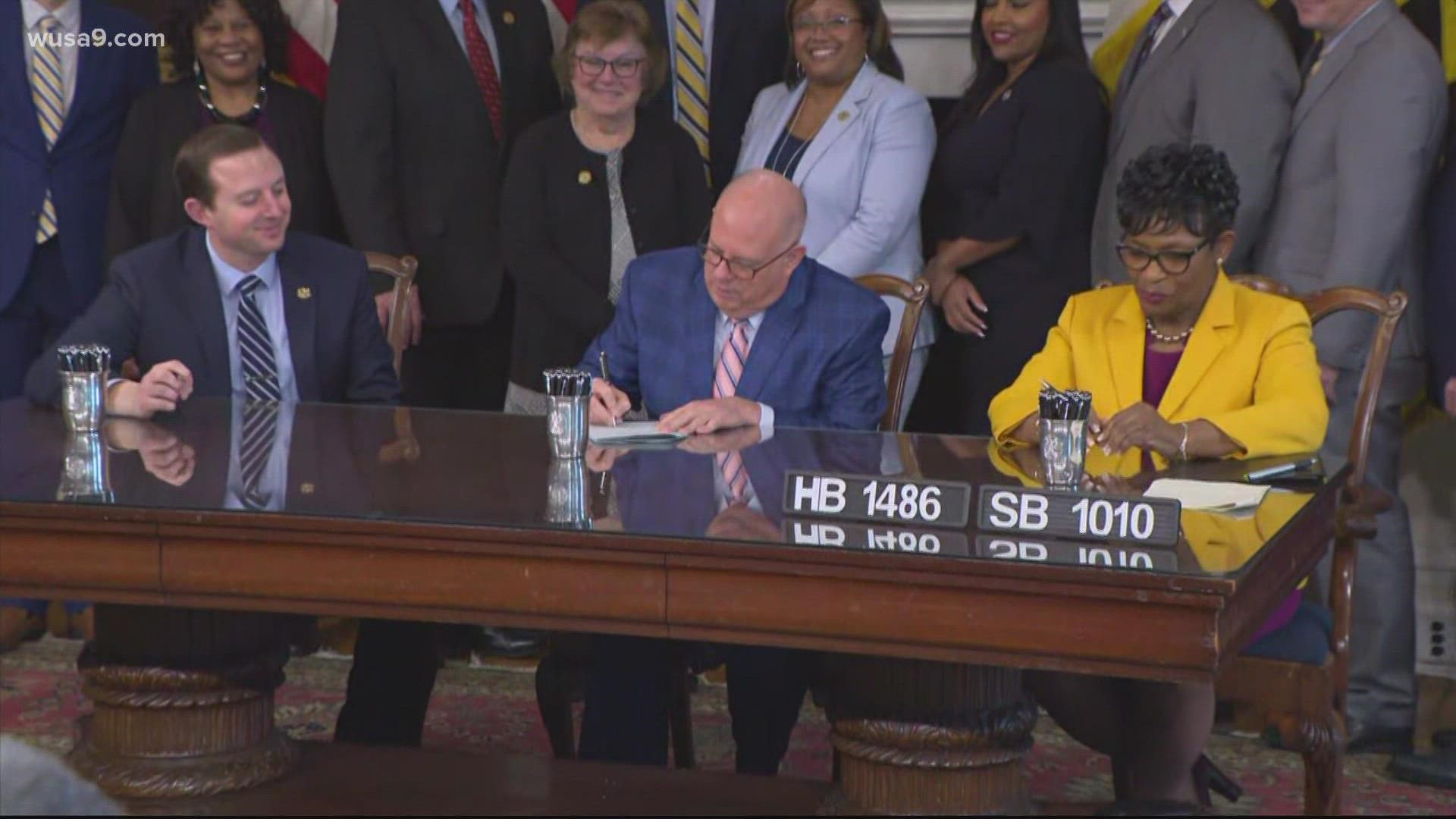ANNAPOLIS, Md. — Editor's Note: The video above originally aired on March 11.
Gov. Larry Hogan signed a bipartisan bill into law Friday to suspend Maryland's gas tax through April 16. Emergency legislation to suspend the state gas tax for a 30-day period passed in the House and Senate on Thursday.
Gas prices began plummeting almost immediately at many stations because the bill contained a provision allowing retailers to get rebates for taxes already paid for fuel in their tanks at the time the bill was signed.
On New Hampshire Avenue in White Oak, most stations were offering unleaded regular for $3.85 per gallon by late afternoon.
In some cases, the prices were more than 50-cents lower than peaks hit on March 10.
An agreement was reached between state lawmakers and the governor on March 10 to provide Marylanders a "gas tax holiday" for a one-month period as commuters are feeling pain at the pump.
Hogan praised the lawmakers at a bill signing ceremony in Annapolis Friday, touting the suspension as the first in the nation as gas prices are soaring because of inflation and sanctions imposed on Russia.
"This bipartisan action will provide some relief from the pain at the pump," Hogan said.
The gas tax holiday would save drivers just over 36 cents per gallon, as prices at the pump are soaring with inflation and sanctions imposed on Russia.
AAA reports the average price per gallon Marylanders are paying is $4.17, which is slightly less than the national average of $4.27 Friday.
Hogan said the bill is not a "cure-all" but because Maryland is "in a stronger fiscal position than it's ever been before" leaders "can't afford" to not help families and seniors in need of financial relief.
"In these uncertain times, as Washington seems to remain divided and gridlocked, Maryland has once again shown that we can still come together across party lines to put the people's priorities first and to deliver real, bipartisan, commonsense solutions to the serious problems that face us," Hogan said.
Maryland Comptroller Peter Franchot announced in a statement the implementation of the temporary law is currently in effect and runs through 11:59 p.m. April 16.
Franchot predicted the legislature will be called back at the end of 30 days to extend the holiday to three months because of global events.
Franchot, who is running as a Democrat for governor, has been advocating for a 90-day gas tax holiday since mid-March, which would provide $250 million in tax relief.
The state already has a budget surplus of $7.5 billion due to in part COVID-19 relief funds and state income tax revenue, according to the Maryland Board of Revenue Estimates.
Franchot praised lawmakers in the statement issued Friday but reiterated his previous position that the relief was not long enough.
"This gas tax holiday returns $100 million to Marylanders’ wallets and should provide economic relief for motorists who have seen prices soar in recent weeks," Franchot said in the statement. "While I continue to believe that a three-month gas tax holiday would have offered more substantial savings and been easily absorbed due to the state's historic surplus, any respite from the current pain at the pump is welcome."
As the comptroller, Franchot serves as the state's chief fiscal officer and motor fuel regulator. He said the bill does not mandate retailers reduce their prices by 36 cents, but "the Comptroller’s Office is actively working with industry leaders and the state’s roughly 2,300 gas stations to encourage them to lower their prices so motorists realize the savings in full, as intended."
Other state lawmakers have expressed that they would prefer if the relief lasted longer than 30 days.
Maryland Senate Republicans tweeted Thursday after the passing of the bill there's still more work to be done to offer tax relief to families and retirees in the state.
The House Ways and Means Committee then voted favorably on SB1010, which was adopted in the House.
Majority Leader Del. Eric Luedtke (D-Montgomery County) clarified Thursday after the Senate bill was adopted in the same format as the House bill: "It is the intent of the general assembly that qualifying retailer be interpreted to mean 'any person processing tax-paid qualifying fuel for sale on the effective date of this act' so it applies to every holder of tax-paid fuel in the supply chain," he said on the House floor.
Although only a fraction of U.S. gas comes from Russian oil, prices remain high because the price of oil is set at a global level. According to 2021 numbers from the U.S. Energy Information Administration we imported about 3.3% from Russia, however, any supply disruption or potential disruption will affect gas prices all over the world.

